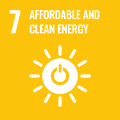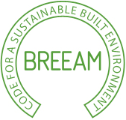In This Section
- Home
- About
- Student Led
- Research Informed
- Practice Focused
- Resources
- Case Studies
- Green Labs Community
- News
- Office of Sustainability and Climate Action
ISO 50001 Certification

ISO 50001 is an International Standard that enables organisations to establish the systems and processes necessary to improve energy performance, including energy efficiency, use, and consumption.
The decision to seek ISO accreditation was made to enhance the University’s reputation over many years in energy management by embracing this internationally recognised system while also ensuring continuous improvement in our energy management practices.
In November 2011, UCC became the first third level institution worldwide to achieve the ISO 50001 standard. UCC was also the first public sector body in Ireland to be certified to ISO 50001.
The University is committed to responsible energy management as part of our overall environmental strategy and has a long track record in energy management, assisted with grant and technical support from the Sustainable Energy Authority of Ireland (SEAI) to support energy saving initiatives. We recognise that our activities impact upon the environment and we are particularly mindful of our environmental responsibilities in local, national and global terms.
The main principals of our Energy Management Systems are detailed below.
University Management Commitment
In adopting the standard, UCC demonstrates its commitment to energy management and conservation. The President of UCC is committed to ensuring that UCC stands out as a College that demonstrates the efficient use of energy to minimise its impact on the environment and can be used as a benchmark for Universities across the globe. The President has approved the energy policy (UCC Energy Policy) for the College and has appointed the Director of Buildings & Estates, Mark Poland, as the management representative, to be responsible for ensuring compliance with this standard and that the standard is subjected to continuous improvement. Mark has the authority and responsibility for:
- Ensuring the EnMS is established, implemented, maintained and undergoes continuous improvement in compliance with the standard.
- Allocating responsibility for energy management activities to the Energy & Utilities Manager.
- Reporting back to the University Management Team (UMT) meetings on energy performance and adherence to the EnMS.
- Ensuring that the energy measures are in line with UCC’s energy policy, promoting the awareness of the energy policy and objectives throughout the College and ensuring that the operation of the EnMS is appropriate and effective.
- Ensuring the energy management approach supports the UCC Energy Policy
Energy Planning/Reviews

Annual reviews are carried out to identify the significant energy users (SEU’s) across UCC as well as the variables and people that can significantly impact them. To determine the SEU’s the following process is applied:
- Review past and present energy performance.
- Identify the SEU’s, the equipment, facilities, variables and people that can impact them.
- Agree energy performance indicators (EnPI’s) for the SEU’s.
- Identify any energy saving opportunities, prioritise and develop a plan to implement the changes.
- Determine method to validate energy saving measures.
Our latest approved 2023 Energy Performance
Design of new buildings and refurbishments
 Projects that can have a significant impact on our energy consumption typically take the form of new buildings, large area refurbishments or vacant space fit out. These projects would be administered by the Buildings and Estates office through its capital projects team. Sustainable design practices are a key design brief in any project that can significantly impact our energy consumption and the office has shown continuous innovation and support for energy efficient design down through the years. A small number of examples include:
Projects that can have a significant impact on our energy consumption typically take the form of new buildings, large area refurbishments or vacant space fit out. These projects would be administered by the Buildings and Estates office through its capital projects team. Sustainable design practices are a key design brief in any project that can significantly impact our energy consumption and the office has shown continuous innovation and support for energy efficient design down through the years. A small number of examples include:
The Lewis Glucksman Gallery in 2005 used an innovative heating and coding system incorporating heat pumps that utilise the supply of ground water. The project won the 2005 CIBSE Best Project Under €20m, UK & Ireland and the 2006 SEAI/ESB Energy Awards for Renewable Energy Technology.
The Tyndall National Institute building, designed in 2006, delivered a state-of-the-art semiconductor research facility which is heated by energy generated from its data servers and process equipment saving 12% on energy costs across its 5,000 sq m research building. The design approach picked up the 2010 SEAI Renewable energy awards.
The Western Gateway building, designed in 2008, uses the thermal energy of the river Lee, which flows directly below the site, in a water sourced heat pump to provides the buildings heating and cooling. Exhaust water from the heat pump is either discharged to the river or direct to storage tanks for use as grey water. The building won the 2011 CIBSE Ireland SDAR Award.
The Mardyke Arena, refurbished in 2010 employs a combined heat and power plant (CHP) to generate 50% of the Arenas energy requirements on site.
Our current projects such as the Student Hub and Crows Nest follow the Near Zero Energy Building guidelines set down in the latest Building Regulations as well as aligning the design process to BREEAM and LEED requirements.
Procurement of Energy Services, Products, Equipment and Energy.


As UCC is a public body, all significant procurements are steered by the Irish States various public sector procurement procedures and regulations. Our electrical and natural gas contracts are purchased collectively through the Office of Government Procurement. Through these collective contracts UCC strives to purchase from renewable energy sources.
Energy conservation plays a major role in the tendering and ongoing maintenance contracts of our building services while our new and replacement equipment items are sourced from the SEAI Triple E Product Register or equivalent.
Monitoring, Measurement and Analysis
An extensive energy monitoring system is used to meter electrical and natural gas usage on site.
Weekly energy performance indicators are sent to the responsible manager(s) for the SEU to measure their actual verses expected energy consumption. Significant deviations in the EnPI’s (+ 10%) are tracked and investigated.
Internal audits take place on an annual basis through the office of the Energy & Utilities Manager to ensure that energy conservation measures are in place while also assisting and learning from building managers in identifying energy saving opportunities.
Should you wish to find out further information on our ISO 50001 programme please drop Pat a mail at p.mehigan@ucc.ie
UCC Energy Policy
UCC's Energy Policy can be downloaded here UCC Energy Policy
Green Campus
Contact us
University College Cork, College Road, Cork T12 YN60,
- greencampus@ucc.ie
- Dr Maria Kirrane, Sustainability Officer - m.kirrane@ucc.ie
